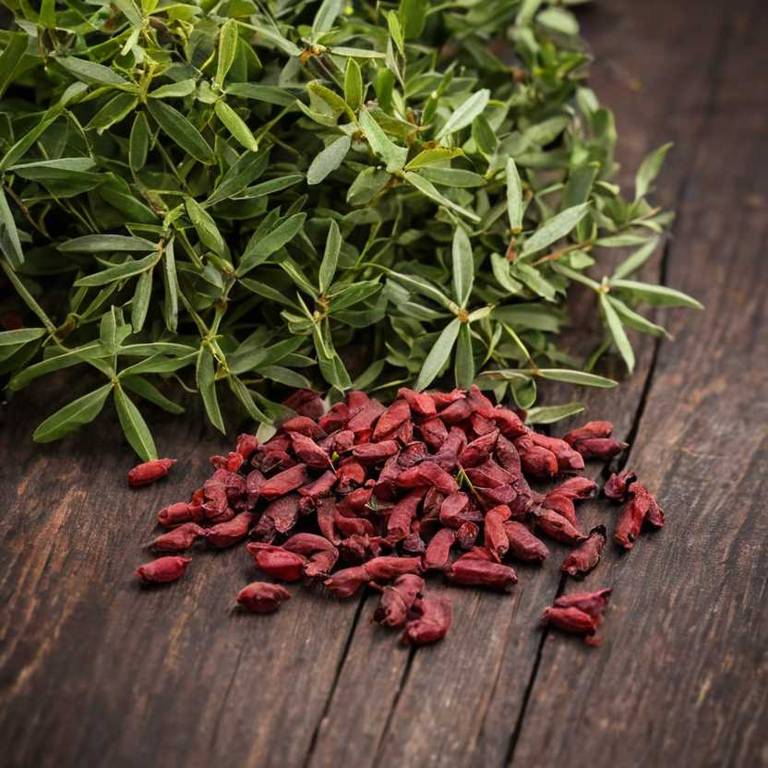By Leen Randell
Updated: Jul 06, 2024
10 Health Benefits Of Berberis Vulgaris (Barberry)

Berberis vulgaris, also known as barberry, has health benefits such as antimicrobial, antifungal, and anti-inflammatory properties.
Its medicinal benefits include reducing inflammation and improving digestion. Berberis vulgaris can help alleviate symptoms of irritable bowel syndrome (IBS) and reduce the risk of heart disease by lowering cholesterol levels. Additionally, its antimicrobial properties can aid in wound healing and prevent infections.
Overall, its health benefits can significantly improve the quality of life for individuals suffering from various digestive and circulatory issues.
This article explains in details the 10 best health benefits of Berberis vulgaris.
1. Boosts immune system
Berberis vulgaris boosts immune system because it contains berberine, a bioactive compound that exhibits potent antimicrobial and antioxidant properties.
Berberine has been shown to stimulate the production of cytokines, which are proteins that help fight off infections and inflammation, thereby enhancing the body's natural defense against diseases.
Additionally, berberine has been found to inhibit the growth of pathogenic bacteria, viruses, and fungi, further supporting its immunomodulatory effects.
2. Fights bacterial infections
Berberis vulgaris fights bacterial infections because of its unique composition.
The plant contains a compound called berberine, which has been shown to have potent antimicrobial properties that target and disrupt the cell membranes of bacteria, ultimately killing them.
Berberine's effectiveness against various types of bacteria, including multidrug-resistant strains, has led to its use in traditional medicine for centuries, and continues to be studied and utilized as a potential natural treatment option today.
3. Combats fungal infections
Berberis vulgaris combats fungal infections because it contains a rich concentration of berberine, a bioactive compound that exhibits potent antifungal properties.
Berberine has been shown to inhibit the growth and reproduction of various fungal species, including Candida albicans and Aspergillus niger, by disrupting their cell membranes and preventing the formation of biofilms.
This makes barberry a promising natural remedy for treating fungal infections, particularly in patients with compromised immune systems.
4. Reduces inflammation
Berberis vulgaris reduces inflammation because it contains a variety of bioactive compounds, including berberine and other alkaloids.
These compounds have been shown to possess potent anti-inflammatory properties, which can help to reduce the production of pro-inflammatory cytokines and eicosanoids.
Additionally, barberry's flavonoids and phenolic acids may also contribute to its anti-inflammatory effects by scavenging free radicals and modulating the activity of various inflammatory enzymes.
5. Lowers blood sugar levels
Berberis vulgaris lowers blood sugar levels because of its active compound berberine.
Berberine has been shown to increase insulin sensitivity and glucose uptake in the body's cells, thereby reducing blood glucose levels. Additionally, it inhibits the activity of enzymes that break down starch into glucose, further slowing down the absorption of sugar into the bloodstream.
These mechanisms make barberry a potentially effective natural remedy for managing type 2 diabetes.
6. Improves heart health
Berberis vulgaris improves heart health because of its unique combination of bioactive compounds.
The plant contains berberine, a naturally occurring compound that has been shown to lower cholesterol levels, improve blood lipid profiles, and reduce the risk of cardiovascular disease.
Additionally, barberry's antioxidant properties help protect against oxidative stress, inflammation, and platelet aggregation, all of which contribute to improved cardiovascular health and reduced risk of heart disease.
7. Treats diarrhea
Berberis vulgaris treats diarrhea because of its natural anti-inflammatory and antimicrobial properties.
The plant's berries contain a compound called berberine, which has been shown to reduce gut inflammation and inhibit the growth of harmful bacteria that can contribute to diarrhea.
Additionally, berberine has been found to increase water absorption in the gut, helping to normalize stool consistency and frequency.
8. Prevents kidney damage
Berberis vulgaris prevents kidney damage because of its potent antioxidant and anti-inflammatory properties.
The plant's active compounds, berberine and berbamine, have been shown to reduce oxidative stress and inflammation in the kidneys, thereby protecting against damage caused by chronic diseases such as diabetes and hypertension.
Additionally, barberry has been found to improve blood flow and lower blood pressure, further reducing the risk of kidney damage.
9. Alleviates menstrual pain
Berberis vulgaris alleviates menstrual pain because it contains a compound called berberine, which has been shown to have anti-inflammatory and analgesic properties.
Studies have demonstrated that berberine can help reduce prostaglandins, hormone-like substances that cause contractions of the uterus and subsequent menstrual cramps.
Additionally, berberine may also help relax smooth muscle tissue in the uterine lining, further alleviating cramping and discomfort associated with menstruation.
10. Protects liver
Berberis vulgaris protects liver because of its unique composition and therapeutic properties.
The plant's alkaloids, berbamins, berberastin, and palmatine, possess potent antioxidant and anti-inflammatory activities that help to detoxify the liver and neutralize free radicals.
Additionally, barberry extracts have been shown to inhibit the activity of enzymes involved in lipid peroxidation, further supporting its hepatoprotective effects and making it a valuable natural remedy for liver health maintenance.